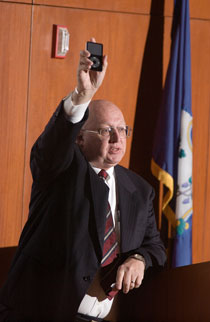  |
| HOME | THIS ISSUE | CALENDAR | GRANTS | BACK ISSUES | < BACK | NEXT > |
Digital age copyright challenge by Suzanne Zack
- April 10, 2006
|
||||
|
Standing on the stage of Konover Auditorium on Tuesday, copyright expert Robert Oakley held up an iPod and asked how many in the audience had one, or a similar device that plays songs, podcasts and videos.
Almost everyone’s hand went up. Then he asked how many people lawfully acquired and paid for the contents of their mp3 players. About half the hands remained up – along with nervous laughter. One need only witness the popularity of the iPod to understand how digital technology is revolutionizing copyright law today, said Oakley, Director of the Law Library and a Professor at the Law Center at Georgetown University. Digital distribution is everywhere. As concerned as rights owners were over the profusion of photocopiers and VCRs back in the 1970s, Oakley said, they are far more concerned today over digital technology and networks that now make it possible to make perfect copies and distribute them anywhere instantaneously to millions of people. “Digital changes everything,” he said. Oakley spoke at a public forum sponsored by the University Libraries entitled “Whose Rights & Who’s Right: Copyright in the Digital Age,” which provided a primer on copyright law as well as current issues in the field. “Digital technology makes it difficult to control copying and has copyright owners scared,” Oakley said. “They fear the loss of their markets, and they are taking legal action more aggressively than ever – and against individuals, not just big-time pirates.” Many of these issues affect universities and libraries directly, in areas such as distance learning, courseware (for example, WebCT), podcasts, and electronic reserves. According to Oakley, copyright was originally intended to promote creativity and the creation of new works or knowledge. It also ensures compensation to authors and inventors but not to publishers or record companies. He also discussed the concept of “fair use,” stating the need to consider all four factors outlined in the law when deciding whether the use of a copyrighted work is “fair.” Those factors are the purpose and character of the use; the nature of the copyrighted work; the amount and substantiality of the portion used; and the effect on the market. Oakley also outlined several current issues, including “orphan works,” in which the copyright owner cannot be located to give permission for use of a work. Under currently proposed legislation, the user would have to make a reasonable effort to locate the copyright owner, and if the owner can’t be found, the work may be used. If the author later appears, the user would pay no damages, and the proposal gives compensation options dependent upon the actual use of the work. Fortunately, he said, publishers and librarians are in remarkable agreement regarding “reasonable effort.” Photographers are less pleased, because their works are often unmarked and images are easily reproduced. Oakley suggested several ways in which copyright law needs to be updated for today’s digital environment. For example, the U.S. Register of Copyright has appointed a group to re-examine the provision that allows libraries to make preservation copies of materials. The current law requires that materials be damaged or deteriorating before copies can be made, but with digital files, the originals may be unusable by that point. Furthermore, digitized preservation copies of books and other materials may be viewed only on site, which makes little sense in an age of wireless networks. “The take-away message from today is that it is increasingly important for the University to have policies in place about the use of copyrighted material and to have a way to advise faculty, staff and students about what they can and can’t do in this new environment,” Oakley said. “To the extent that that is being worked on, that’s a good thing; to the extent that it’s not, it is important to put the mechanisms in place.” A small group of UConn librarians has been examining copyright issues this past year with to identify problems and the resources to address them at the University. Archivist Betsy Pittman described the group’s progress and previewed a copyright web site that is currently under development. To view a videotape of the presentation, contact Barbara Oakley at 860-486-3990 or barbara.oakley@uconn.edu. |
| ADVANCE HOME |

